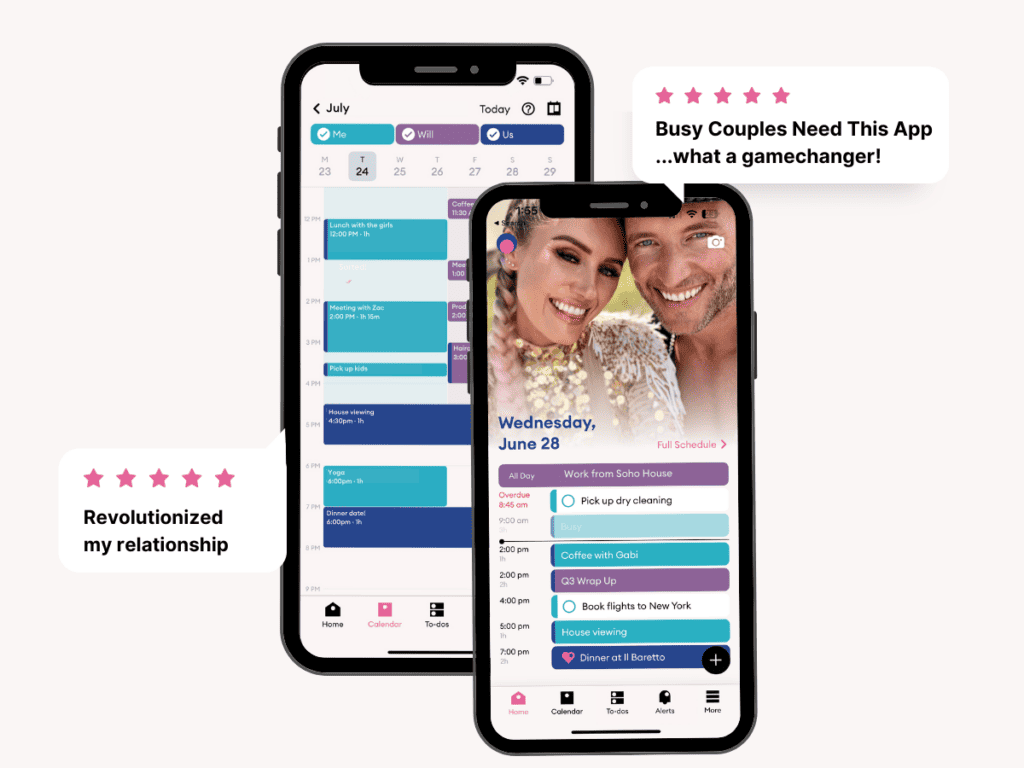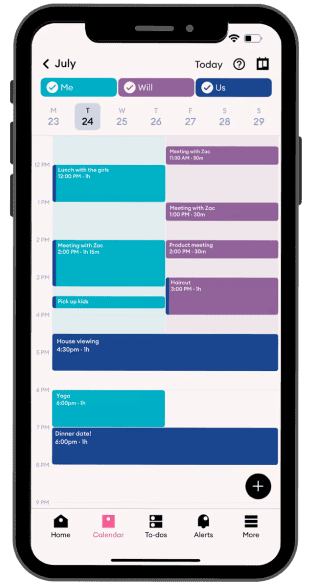So you’ve finally made the big move. After packing up and waving goodbye to your single life, you placed every last box in the living room of your new apartment and settled in with your partner into a place that is truly yours.
Everything is going well, you make dinner and they clean the dishes. A week passes and the two of you do a big cleaning day together that feels a lot like domestic bliss. There are a few reminders to keep the bedroom tidy, but you decide it’s a beige flag.
Then the novelty wears off. You’ve been here for weeks or months and slowly start to realize that cleaning days are less of a joint effort than before. They finish up their work for the day while you make dinner and clean up the dishes. You fold laundry while they unwind, and then you both fall into the bed you made, with sheets you washed.
It starts to wear on you, but you aren’t sure how to make a change. Heck, you aren’t sure how you got here in the first place. It’s a familiar tale for many couples, leading to over 1 in 3 people ending a relationship over chores.
But it doesn’t have to be that way. With planning, awareness, and communication, you can get back to that initial feeling of domestic bliss.
Keeping it Together
We might inherently know that sharing domestic chores with your partner is important, but it can be difficult to articulate why. Some would argue that if a clean space is more important to one half of a couple, it should be their responsibility.
However, the act of splitting up chores can actually strengthen your relationships. It’s a great way to practice and push for open communication, and provides a clear way for the two of you to show you care for one another.
Studies show that couples who share chores equally are way happier and feel more in control of their lives. Proving that you can rely on one another for the little things makes a huge difference when you face bigger issues as a team.
Where Things Get Messy
So it’s important to have work shared fairly and equitably between partners. That’s clear enough. The challenge comes when deciding what fair really means. There are tons of factors that go into this decision, including
- Existing Workloads
- Skills and Preferences
- Time Availability
The important thing is communication and making a real plan. Otherwise, your relationship might fall into old habits, or get sabotaged by traditional gender roles and norms.
The Pink and Blue Elephant
Studies have consistently shown that women are responsible for the majority of the housework in straight relationships. This hasn’t changed even as women become equal earners and get more jobs outside the home.
The Twice-Over
Even if you’ve successfully set out a clear plan for how both partners can handle the cleaning, it might not be enough. A staggering 61% of people have to re-clean things their partner already cleaned because of different standards.
Communication is so important here, otherwise someone ends up doing twice as much work as they planned.
A Question of Values
Only 9% of people say their partner consistently finishes their chore list, and this can be exacerbated by weaponized incompetence. If you or your partner don’t see the value in domestic chores, there might be the temptation to fail at a task so you don’t get asked again.
What’s worse, this undervaluing of housework can make the perpetrator completely miss how damaging this kind of incompetence is to the mental health of their partner, and the relationship as a whole.
Rolling Up Sleeves: How To Split Chores Equitably
What can be done to bring your happy lovers’ nest back into focus? There are a few proven strategies that can help you to tackle the difficult conversation and gritty work of actually sharing domestic chores.
Open and Honest Communication
Like most issues within relationships, the biggest help for chore duty is communication. By discussing, defining responsibilities, and making a plan before tackling chores, your chance at relational satisfaction jumps from 31% to 75%.
This should be an ongoing thing. Regularly check in with your partner and make sure you’re both happy and getting what you need for your home. A great tool for this is a to-do list. Using an app like Cupla, you can list out all the responsibilities around the house.
One of the biggest issues with chore delegation is one partner not realizing how much work goes into upkeep. Setting up a to-do list visually shows what needs to happen, and makes it that much easier to assign tasks.
It also allows for a level of accountability. You can check in with one another about the tasks still needing to be done.
Share Calendars to Stay Up-to-Date
Having a shared calendar as a couple can be a tremendous help across the board, but when it comes to delegating housework, it’s extra important. When you’re able to visually see your partner’s schedule, and how the housework is divvied up, it leads to
- Improved Organization – You can see when things are getting done and ensure nothing goes overlooked
- Fair Division – Seeing visually who’s responsible for what eliminates the reliance on memory and verbal communication, which can lead to missed tasks
- Avoiding Conflict and Resentment – Clearly documenting responsibilities reduces the chances of perceived imbalances
- Accountability – A calendar creates a sense of ownership, and allows your partner to see when you should be doing a task
- Time Management – If something comes up in one person’s schedule, it’s easy to cover their chores and adjust accordingly
Ultimately, a shared calendar is essential to communication and co-habitation.
Other Tips and Tricks
Beyond making a plan and setting times for things to get done, you and your partner should
- Embrace a Team Approach – Think of household chores as shared responsibilities rather than individual tasks
- Challenge Gender Stereotypes – If you’re in a straight (or straight-passing) relationship, be mindful of how gender roles have shaped your view of housework. Encourage both your partner and yourself to try out tasks that are traditionally associated with the other gender
- Express Appreciation and Gratitude – Letting your partner know you see and appreciate their effort can encourage more contributions, as well as lighten the emotional load of caring for your home
- Be Flexible and Willing to Adapt – Life circumstances and priorities change, so be willing to adjust chore responsibilities accordingly
By coming to chores with an open and honest mindset, you and your partner can find ways to joyfully and lovely care for your home.
The Clean Sweep
Want to keep household jobs from hurting your relationship? The Cupla app has everything you need to stay on top of chores, and communicate with your partner on the go.
With a to-do list, shared calendar, and easy planning for all of life’s messiness, Cupla can easily revolutionize the way your relationship operates, ensuring you can keep cleaning up after one another far into the future! Get a free trial now on iOS and Android.














